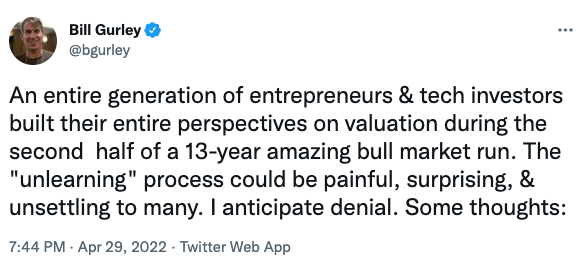Stock market commentators, with long memories and gloomy temperaments, have been warning for years that the tech sector is wildly overvalued and will crash. Now it has.
The New York Nasdaq, which contains many of the world’s most valuable listed tech companies, has fallen 26% this year. Once high-flying companies, such as Netflix and Peloton, which helped keep us distracted and fit during the pandemic, are down 70% and 60% respectively.
Ark Innovation’s ETF, seen as the speculative pin-up fund for one of the most extraordinary bull runs in history, has fallen 68% since its peak last October. “Innovation is on sale,” Cathie Wood, Ark’s hyper-enthusiastic founder, said in January when the fund was worth a lot more than it is today.
And it’s not just US tech stocks feeling the crunch. Tech shares have fallen sharply in Europe and China, too. Deliveroo, which listed in London last year, is down 58% this year. Sweden’s Spotify has fallen by 61%.
The simplest explanation for the crash is financial gravity: what goes up eventually comes down. The valuations on the raciest tech stocks reached nosebleed territory and are now returning to historic trend. But surging inflation, rising interest rates, an economic slowdown and the global supply shocks caused by the war in Ukraine appear to have triggered the latest downturn.
What’s the impact on private markets and VC funding?
The critical question for startups and VC funds is what impact the stock market falls will have on private market funding flows and valuations — and future IPOs. There are plenty of investors warning of a sea change in sentiment. Here’s a tweet from Benchmark’s Bill Gurley:

The frenzied IPO market, which saw an extremely strong 2021, has already taken a hit, with activity slowing sharply in the second half of the first quarter.
According to EY, the global IPO market saw 321 deals in Q1, down 37% on the previous year. In total, these IPOs raised $54.4bn, down 51%. Special Purpose Acquisition Companies (SPACs), which had become all the rage in the past few years as a quick and dirty way of listing companies, have all but disappeared.
With fewer IPOs, there is less money for institutional investors and VCs to recycle into the next generation of startups, although there is clearly a time lag. Global VC funding has already fallen 19% per cent in Q1 2022 compared with the previous quarter, according to CB Insights.
Some of the “tourist”, or non-traditional, investors who have been most active in latter-stage private market fundings are suffering badly and may retrench or go home. Crossover funds, such as Tiger Global and Coatue, which were such big players in extending the runway of pre-IPO private companies, have seen savage losses this year on the valuations of their holdings.
In spite of the pain, many investors argue that the blowing away of the speculative froth in the tech market is both overdue and healthy. With the end of cheap capital, startups will have to focus on building sound businesses with stronger financial fundamentals. But capital-guzzling companies such as super-fast food delivery startups, that have splashed the cash to build market share, may be particularly exposed.
The VC model of blitzscaling unicorns between 2010 and 2020 is over
“The VC model of blitzscaling unicorns between 2010 and 2020 is over,” says Johannes Lenhard, a Cambridge academic who researches the VC market.
“The idea that you put an enormous amount of capital into a company that does not make money and sell it on to tourist investors or through an IPO and smile and leave without producing any economic value is not going to work any more.”
What should startups do?
The swings in tech market valuations are already shifting the balance of power from entrepreneurs to investors. Startups planning to IPO this year may have to sit on their hands longer. Earlier this year, the Dutch file-sharing company WeTransfer cancelled its IPO citing unfavourable market conditions. This month, the German publisher Springer Nature also pulled its €3.2bn flotation due to weak investor demand.
The corporate M&A market has also slowed, making trade sales trickier. The value of M&A deals in the first quarter of this year fell 23% to $725bn compared with the previous quarter, according to GlobalData. Those raising bigger, later-stage rounds of more than $50m may now find it more difficult, expensive and time-consuming to do so. Haggling over valuations, term sheets and founder rights may become even more strained.
Lily Shaw, an investor at Omers Ventures, says companies might be better advised to take money in a clean Series B deal at a $200m pre-money valuation rather than hanging on for a messier term sheet offering $300m. “Taking a cleaner deal at a lower valuation might make more sense,” she says.
If you can get to cash flow break even, then do that now. Because then you are controlling your own destiny
The advice from investors and experienced entrepreneurs is pretty similar to that given at the start of the pandemic: to focus on your core business, communicate with your shareholders, preserve cash and extend your financial runway as much as possible to ride out the rough times. “If you can get to cash flow break even, then do that now. Because then you are controlling your own destiny,” says Albert Wenger, managing partner of Union Square Ventures.
But startups should also look to seize the opportunities thrown up by the market slowdown. It may be a great time to poach good people from struggling competitors, for example. “If you are a B2B SaaS company with a 90% gross margins and two years of runway, then you have some great opportunities,” says Shaw.
And many VC firms are still stuffed with cash from record fundraisings in previous years and have no alternative but to invest their money. Early-stage investments look well sheltered from the storm.
James Wise, a partner at Balderton, says VCs will become more selective and hold back some cash to ensure their best category-defining investments remain well funded. But there will remain intense competition to fund the most promising startups, particularly in hot sectors such as healthtech, biotech, renewable energy and advanced materials. “We think decarbonisation is the economic story of the next decade,” he says.

Despite all the doom-laden talk about market crashes, all we may be seeing is a return to the historic patterns of funding, says Hampus Jakobsson, general partner at Pale Blue Dot, the Malmö-based seed stage VC firm. The last two to three years have seen absurdly low inflation and interest rates and absurd amounts of capital flooding into the startup market. “We have had two to three years when all the water in the world turned into mercury and everything floated. Now mercury is turning back into water and we will see which boats are full of holes,” he says.
In this new watery world, startups and VCs should be focusing again on old-fashioned metrics. “For the past two years, no VC or startup before Series A has heard of discounted cash flow," Jakobsson adds. "We need to start talking about this again. If, as a founder, it is a question of prioritising growth or monetisation, you should go for monetisation.”



